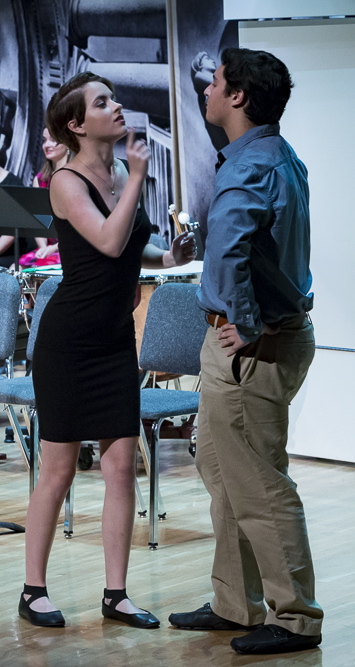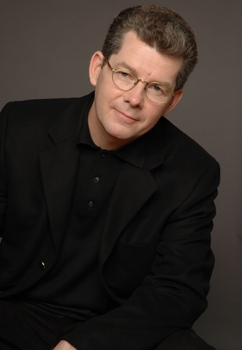Frost Opera Theater serves up bite-sized dramas in varied feast

Samantha Taylor and Maxwell Herman in Frost Opera Theater’s “Selected Shorts” Wednesday night at Gusman Concert Hall. Photo: Shawn Clark
From the epic saga of Wagner’s Ring cycle to concise one-act monodramas, the world of opera spans multiple genres, shapes and sizes.
The University of Miami’s consistently innovative Frost Opera Theater presented a program of nine short works (one of them performed twice) at Gusman Concert Hall on Wednesday evening, showcasing a gifted group of young singers in adroit semi-stagings by Jeffrey Buchman.
A dozen members of the Frost Symphony Orchestra accompanied the scenes onstage.
With some singers reading scores, rear projections and subtle theatrical interplay conveyed the mood of a series of vignettes lasting between two and twelve minutes. Unfortunately the supertitles system failed twice during the performance. Under the circumstances, singers with strong English diction fared best.
Paul Hindemith’s Hin und Zurück (There and Back), written in 1927, opened the evening. The jazzy, anarchistic idiom of many of Hindemith’s scores in the 1920’s is far removed from the conservatism of his later works. In this mini-drama reminiscent of a silent film short, a husband arrives home with a gift for his wife on her birthday. When a letter arrives for the wife, the husband’s jealousy flares and he stabs her. Overcome with remorse and shame, he then commits suicide. A noble sage arrives and announces that life need not be tragic. He declares that fate will be reversed and the action is repeated backwards, leading to a happy ending.
Alan Johnson conducted Hindemith’s snappy syncopations with idiomatic flair. As the less-than-happy couple Linsey Coppens and Charles Dugan brought out the subtle wordplay in dramatically compelling fashion. Andrés Lasaga’s attractive, sizable tenor as the Sage was a standout. Indeed in multiple roles throughout the program, Lasaga’s vocal and dramatic skills consistently earned attention.
Hand of Bridge with a score by Samuel Barber and libretto by Gian Carlo Menotti was given multiple traversals with alternate female protagonists. The work of two American masters, the opera was definitely the strongest work on the evening’s menu. A tale of two unhappily married couples who meet for a card game every week and reveal in brief monologues their anguish and inner desires, the work is both moving and terrifically entertaining. Menotti’s text is replete with surprising turns of phrase and Barber’s score ranges from catchy, jazz-tinged motifs for the bridge game to moments of expansive lyricism as one of the female protagonists laments her loneliness and lack of love.
Johnson perfectly captured those shifting moods at the keyboard. Yotsawan Meethongkum’s deep, well-focused baritone conveyed David’s bitterness toward his employer and Lasaga’s finely modulated vocalism astutely reflected Bill’s longing for his mistress. Leslie Zapiain brought poignancy and exquisite tone to Geraldine’s lament. Shannon Richards was less emotional but soared in the score’s most striking moments. Danting Xia was persuasive as the flighty Sally.
Lukas Foss’s Introductions and Good-Byes, like the Barber work, was conceived in 1959 for Menotti’s Festival of Two Worlds in Spoleto, Italy. It is a diverting entertainment set at a cocktail party as a host greets the guests and then bids them adieu. Along the brief way, Buchman’s witty direction showcased romantic trysts, arguments and fun and games among the party crowd. Foss’s neo-classicism sets the mood in breezy strokes. Taylor Stilson was a music theater performer to the manor born as the hosting Mr. McC with the depth of voice to match.
Six musical mini-dramas by Frost faculty member Thomas Sleeper completed the fascinating bill of fare. (Five were from Sleeper’s 2015 cycle Einstein’s Inconsistency.) The longtime conductor of the Frost Symphony Orchestra, Sleeper is also a highly gifted composer with a fine ear for tone and atmosphere. In “Leviathan,” a heretic falls into the sea and is swallowed by a whale. He remains alive and hears a voice that turns out to be a marionette also consumed by the creature. Sleeper’s dark, churning orchestral score’s suggests the unforgiving tempest of the sea. Guest artist John Duykers (a veteran character tenor who originated the role of Mao Tse-Tung in John Adams’ Nixon in China) commanded the heretic’s declamation in high powerful tones and flawless textual enunciation. Elena Bylskal’s brief interjections as The Voice added vocal color and variety.
In “Rubric’s Cubicle,” a worker attempts to tell his bureaucratic administrator that he has resigned but the superior seems only interested in completing his rubric assignment. Sleeper’s angular rhythms tippled over each other as Lasaga and Cameron Sledjeski’s verbal acuity enlivened the agile exchange.
Dugan was the impressive lead priest who discovers that his own father has stolen from the altar of St. Anthony in the terse “St. Anthony’s Loss.” Zapiain was terrific in the Bergian tessitura of the woman who displays a tabloid announcing the end of the world to a stranger before making love, then slitting the man’s throat before going on to the next stranger with the tabloid. Buchman had her show the paper to Johnson on the podium in a final tongue-in- cheek flourish. With a projection of space on the backdrop, Duykers’ short monologue was fiercely declamatory in “Job’s Answer.”
Sleeper’s The Sisters Antipodes was previously staged by the Frost forces. Based on an autobiographical memoir by librettist Jane Alison, the opera is a study of the emotional turbulence of two young girls who are the children of divorces in which their parents have exchanged partners. The cynicism and melodic felicity of Stephen Sondheim imbues Sleeper’s appealing score. The orchestration is lustrous and colorful despite the ensemble’s chamber scale. Laura Modglin and Mia Tamburrino’s well-blended voices coped skillfully with the music’s high range while Coppens and Stilson suggested the parents’ uneasy alliance.
Sleeper’s video composition and sets by Sherri Tan (Sleeper’s wife) brought atmosphere to the operatic cameos. Johnson drew precise articulation from members of the orchestra in the varying idiomatic signatures of the scores. The evening proved a rewarding exploration of operatic mini-bites.
The Frost Opera Theater presents “Lully to Debussy” 7:30 p.m. December 15 and 16 at the UM Clarke Recital Hall in Coral Gables frost.miami.edu
Posted in Performances
Leave a Comment
Thu Oct 12, 2017
at 1:55 pm
No Comments







